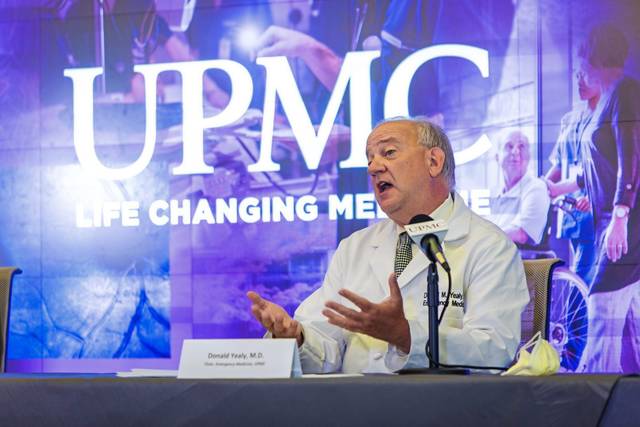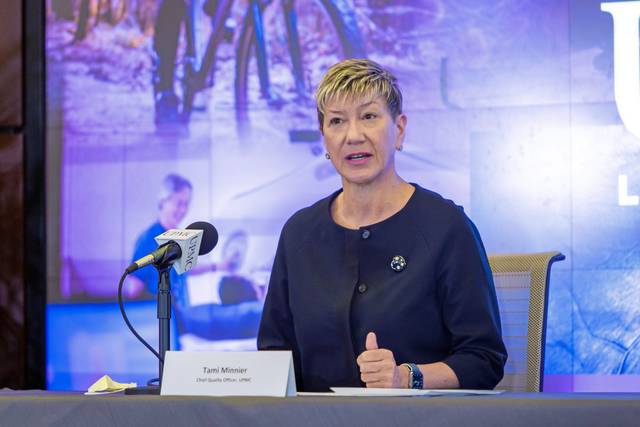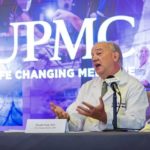While parts of the nation are dealing with an increase in covid-19 cases, local patient outcomes are actually improving, UPMC officials said Wednesday.
Dr. Donald Yealy, UPMC’s chair of emergency medicine, said the health system is seeing the lowest number of hospitalized covid-19 patients since a spike in early April.
“In summary, in our experience, fewer people are being admitted, and when they are, they tend to be much less sick,” Yealy said.
The UPMC update came as Allegheny County announced 45 new positive cases of covid-19 on both Monday and Wednesday, the highest daily totals recorded in nearly two months.
Yealy said a number of factors likely are improving patient outcomes of the disease, despite there being no vaccine. Doctors have “more tools in our arsenal,” he said.
For instance, many doctors are now using steroid drugs such as dexamethasone to treat patients with covid-19. Yealy said UPMC has learned to keep patients off a ventilator unless it’s completely necessary, noticing greater difficulty for patients to successfully come off a ventilator once they’re connected.
As of Wednesday, he said, there are only 14 coronavirus patients within the UPMC system who are on a ventilator — among the lowest numbers since the beginning of the pandemic.
Yealy also touted the system’s success in preventing outbreaks in the system’s nursing facilities, and said UPMC never used more than 5% of ICU beds and ventilators, even during the worst of the pandemic.
UPMC has administered more than 44,000 covid-19 tests, Yealy said. Of those, more than 15,000 were administered to people with no symptoms of the disease. Of those with no symptoms, only one in 400 tested positive. This suggests, Yealy said, there are very few people in the communities served by UPMC who are asymptomatic carriers of the virus.
As the state gradually reopens and people flood to public places, Yealy is optimistic that with appropriate safety precautions, a return to social life can help the population develop greater immunity, especially among younger, healthier people.
But Yealy and UPMC Chief Quality Officer Tami Minnier urged people to remain vigilant, especially as a vaccine remains in the works. Even when a vaccine is developed, Yealy and Minnier said it probably will be most effective for young, healthy people versus elderly patients or those with underlying health conditions.
The most vulnerable populations are still at risk, they said.
“The timing of a safe and effective vaccine is still a big if,” Yealy said.
In preparation for the fall, Minnier said UPMC is growing its supply of personal protective equipment including masks, gloves and face shields. She said the hospital system intends to have a continuous supply of all items for at least three months.
Preparations for the fall are especially necessary as health experts predict a second wave of the virus in that time frame. The UPMC leaders said they expect a spike in testing as people come down with seasonal illnesses such as the cold and flu.
“The reality is, come October and November, we are going to see cold and flu-like symptoms in our communities,” Minnier said. “Infectious diseases will be part of our future.”
UPMC is participating in research through its convalescent plasma program, drawing from blood plasma donated by coronavirus survivors. Minnier said the system will be part of a national network to evaluate the effectiveness of any vaccine developed, while keeping the “key focus” on caring for elderly patients and those with underlying health problems.
Minnier also encouraged basic precautions such as hand washing, social distancing and mask-wearing. She supports a statewide policy requiring masks be worn in all public places.
“This is an important way to protect our vulnerable populations,” she said of masks.
Yealy emphasized there is still little concrete information about the virus, the antibodies it leaves and whether immunity will last in those who survive infection.
“This is a virus that in October of 2019, I didn’t know existed, and neither did anyone else around the globe,” he said. “To have any declarative statements about what immunity looks like and how long it will last is virtually impossible to have.”











